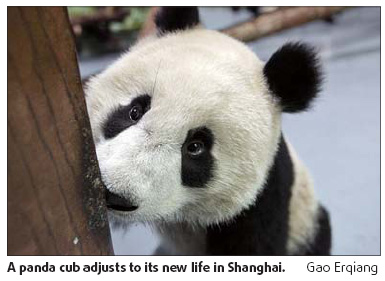The Aoyun (Olympic) and the other nine panda cubs for the Shanghai Expo arrived at Shanghai Zoo last week and soon developed a taste for local bamboo leaves (maozhu), quelling fears of a difficult period of adjustment.

"It's usually a huge challenge to get the pandas to accept any other leaves apart from jianzhu," said zoo spokeswoman Chen Lihua, referring to a kind of bamboo native to Sichuan province. "But it was easier than expected, maybe because they're still young."
The cubs were flown here from the Bifeng Gorge Base of Sichuan's China Wolong Panda-Protection Research Center in Ya'an City, where they spent the first part of their lives acclimatizing to its balmy climate and mountainous geography.
The average age of the cubs is 18 months, equivalent in human years to that of a four-year-old child. One of them, named Aoyun because he was born on Aug 8, 2008 - the opening day of the Beijing Games - is already giving his handlers headaches.
"He's a bit of a loner, actually," said Yang Jie, one handler who accompanied the cubs from the Sichuan capital of Chengdu. "He doesn't like playing with the others, but we hope that by the time of the expo he's much more sociable."
On their first night in Shanghai, the four males and six females were not shy despite the presence of over 100 reporters, devouring their dinner and toying with - but ultimately rejecting - the idea of sliding down the playing apparatus.
The renovated exhibition hall that the cubs are staying in includes a slide, landing stages, climbing frames and nine CCTV cameras.
"The cubs seem to like their new home very much," said Chen. Zoo director Pan Xiuwen said their welfare was the zoo's top priority, even to the extent of catering to their narcissistic whims.
"We prepared a little pond for the females because they need a mirror," said Pan. "Believe it or not, they like to look at themselves in the reflection of the water."
When asked about their unkempt appearance, Chen put it down to their love of climbing on the apparatus and rolling around in the muck.
"Their fur always looks a little dirty," she said. "Pandas naturally secrete an oil, which gives them that yellowish tinge."
Yang said the cubs had a few bumps along the way, but they were adjusting well to life in China's bustling economic hub.
"Two of them got quite agitated when the plane touched down at Hongqiao International Airport. There were a few growls and whimpers, but we got them to calm down," he said. "In a week or two they'll get used to things here."
Officials at the zoo reported no problems as of late last week, describing the cubs as being in a "merry and pleasant" mood. They will introduce themselves to the Shanghai public after two weeks of quarantine, with next Thursday (Jan 21) penciled in for their tentative debut.
"They will be taken care of by the handlers from Sichuan because it's best to keep them in the company of people with whom they are familiar, at least to begin with," said Chen.
"We're also concerned that the different sounds of the Shanghai dialect may unsettle them."
The 10 cubs will move to Shanghai Wildlife Zoo in Pudong for the second half of the year. Shanghai Zoo already has three aging pandas, of which 27-year-old Chuanchuan (80-90 in human years), is now too old to be put on public display.
Pandas have an average life expectancy of 15 years in the wild, or 25 when raised in captivity.

